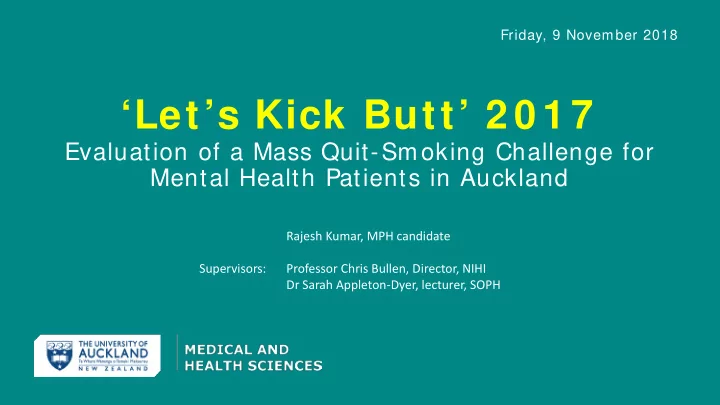

Friday, 9 November 2018 ‘Let’s Kick Butt’ 2 0 1 7 Evaluation of a Mass Quit-Smoking Challenge for Mental Health Patients in Auckland Rajesh Kumar, MPH candidate Supervisors: Professor Chris Bullen, Director, NIHI Dr Sarah Appleton-Dyer, lecturer, SOPH
“The hardest thing about quitting is the anxiety. Every time I was anxious, I would always be grabbing a smoke.” Patient, Greenlane Mental Health 2
“This whole year, the whole year that I ’ve been smoke-free I have been doing my own travelling, like, I just got back from Christchurch this week.” “Once I stopped smoking I could afford to buy a ring my partner always wanted.” Patient, Greenlane Mental Health 3
In 2015 Disproportionately higher rates of tobacco use in m ental health patients ( 5 5 - 6 0 % overall) –Schizophrenia 60 – 85% –Bipolar Disorder 51 - 70% –Major depression 36 - 80% –Anxiety disorders 32 – 60% –Alcohol abuse 34 – 80% –Other addictions 49 – 98% Te Pou (2014). The physical health of people with a serious mental illness and/ or addiction: An evidence review. 4
* Existing initiatives failed to make much headway. * Need for innovative ways to help them quit smoking. * Several motivational tools could be combined to see if that works better. 5
‘Let’s Kick Butt…’ 2017 12-week challenge evolved out of a similar programme called WERO • 85 Long term smokers, half of them Maori/ PI • Teams of 5 clients each • I nter and intra team competition • Cash incentives • CO readings to verify self-reported smoking status • Smoking cessation tools • Group based therapy (GBT) under Motivational I nterviewing (MI ) framework • Extended engagement and relapse prevention support 6
Evaluation (formative) • I mplementation fidelity • Level of client engagement/ acceptance/ satisfaction. • I nfluence of peer support, competition component, cash incentives on the outcomes Attendance rate, dropout rate, changes in exhaled breath carbon • monoxide (CO) readings, changes in the smoking status at completion. 7
FI NDI NGS: • 83% completed the challenge (Target= 90% ) • 36% reported being smoke free. • 60% of the remaining were smoking fewer than five cigarettes a day (against up to 20 cigarettes at the start). • A high (90% ) rate of engagement, acceptance and satisfaction amongst those who completed the challenge. 8
Challenges abound • CO readings don’t always tell the whole story as they are affected by smoking just before the quit session. • Don’t know which motivational tool is more effective; Or whether it is the result of this unique combination/ intensive intervention. • Clients tend to slip back into old smoking habits once the challenge is over. • Some clients had been through multiple quit smoking programmes. How to separate the contribution of this challenge alone? 9
Challenging, but possible Thank you For more info, contact: rkmu628@aucklanduni.ac.nz; kingpokhara@gmail.com
Recommend
More recommend